HP dm1z: Taking Fusion on the Road
by Dustin Sklavos on February 21, 2011 7:00 PM ESTBattery Life
The big news with Brazos, and by extension the HP dm1z, is the substantially improved battery life over Nile. While performance is nowhere near a strict win over that platform (Atom on the other hand...), power efficiency absolutely is. Take a look at this.
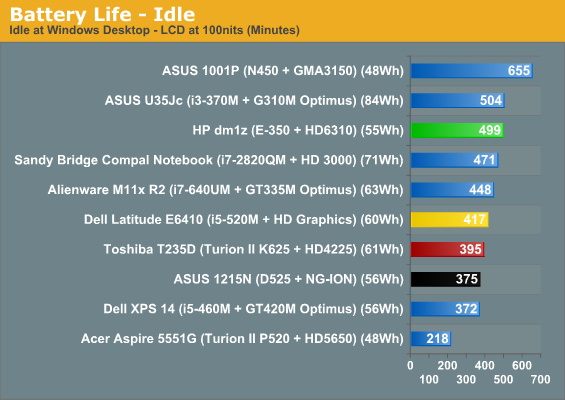

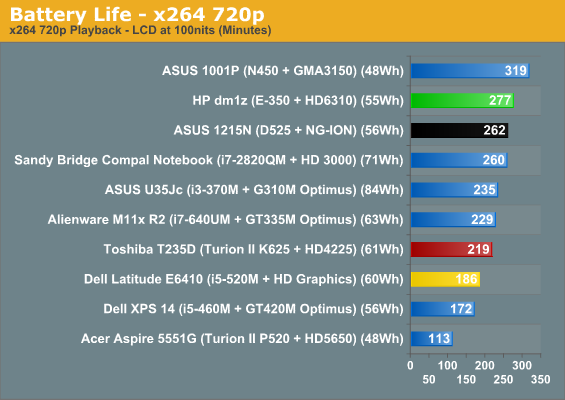
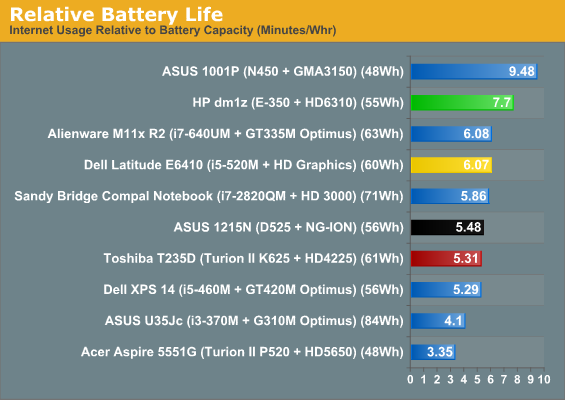
While portable gamers are probably still going to want to hang with Alienware's M11x, Brazos basically tells Intel's dual-core Atom to pound sand. The dm1z doesn't hit the battery life HP advertises (9.5 hours is pretty optimistic, probably only possible with wireless and Bluetooth disabled and the screen at the lowest brightness), but it still pulls more than seven hours of useful running time with a reasonable screen brightness and runs roughshod over Nile.
Heat and Noise
Unfortunately, where things get a little dicey (at least with the HP dm1z) is noise. First, the good news: heat output.
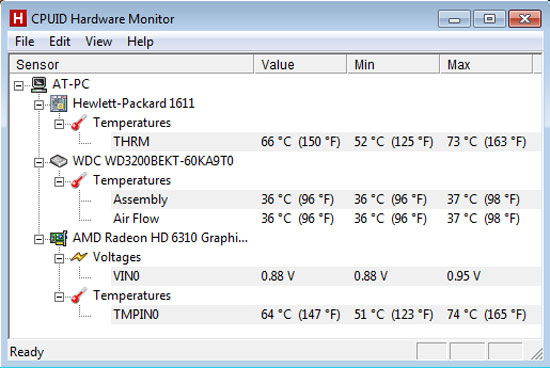
The internal components run at fairly reasonable temperatures, if a little on the high side, but fortunately those temperatures don't translate into an uncomfortable user experience. Quite the opposite in fact: the dm1z can happily be used on your lap without scalding you.
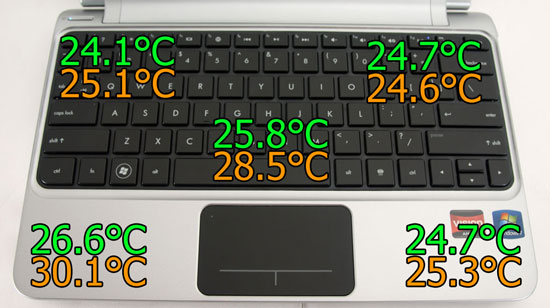
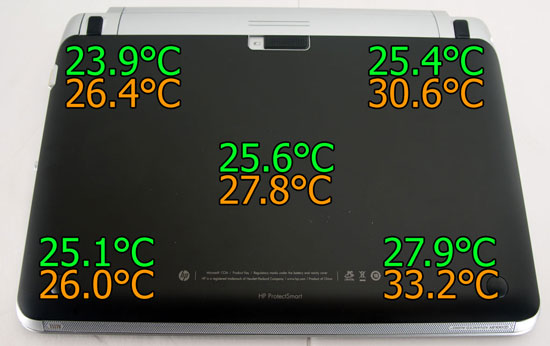
At idle the HP dm1z remains nice and frosty, and under sustained load the outside temperatures don't increase enough to make using the dm1z uncomfortable. But remember what I said about noise?
Part of the reason the dm1z is able to stay so comfortable is because the fan is almost constantly running. It's fairly low and not too obtrusive, but I have an AMD-based 15.6" Sony notebook on hand for review that runs quieter than the dm1z does at both idle and load. That may not be entirely fair because the 15.6" machine has more breathing room in the larger chassis, but it's nonetheless an issue. The fan in the dm1z doesn't spin up that much under heavy load, which would be more appreciated if HP was able to tune it to run just a little quieter at idle. This isn't make-or-break noise, but it's worth bringing up.
Update: Several of our readers pointed out that the HP dm1z has a utility called CoolSense as part of the HP Support Tools. It's supposed to allow some customization fan speeds to allow users to configure their laptop to prefer lower temperatures/higher noise, or lower noise/higher temperatures. As a matter of course we disable most of the manufacturer utilities to allow for optimal battery life results, so the above remarks reflect using the laptop without CoolSense enabled. Unfortunately, the dm1z has already been returned, so we are unable to run updated results. Anecdotally, noise is much better with CoolSense enabled.










108 Comments
View All Comments
Dex1701 - Tuesday, February 22, 2011 - link
So...typing reports is the only advantage a netbook has over current-generation tablets? I can't see how someone could think that's true unless the only thing they use a computing device for outside of work is basic web browsing or MP3 listening.ganeshts - Monday, February 21, 2011 - link
What about those tablet-laptop hybrids? For on-the-go computing, I still would like something more powerful than Atom level performance.From looking at 2 generations of Atom, I think the problem with x86 is that whenever the architects target low power, they reduce the performance so much that is is no longer a good experience with Windows.
The reason I am 'hyping' up tablets is that it gets rid of the Windows OS altogether. (Another reason why I think Windows 7 slates and tablets are going to be DoA). The moment consumers see Windows, they expect a minimum level of performance which is sorely lacking in the Atom class CPUs.
Btw, I would like to get an idea of how much the nettop / netbook market has gone down since the hyped up 2008 days... I don't even see Intel's CedarView getting much coverage now.. It is probably going to be restricted to embedded SKUs.
JarredWalton - Monday, February 21, 2011 - link
Don't forget that a big problem with Atom netbooks is that the inexpensive models most people purchased only had 1GB RAM, which is simply not enough for Windows 7 (or Vista) -- though it was "okay" in XP netbooks. The HD 6310 is about 10X (20X even) better than the GMA 950/3150 in Atom, and the E-350 is more than twice the speed of single-core Atom (and still 50% faster than dual-core Atom in most cases). Heck, Vivek even has a C-50 model in hand and I played with it briefly yesterday. It certainly felt faster than netbook Atom, even at 1.0GHz (but I'm not sure if it has 1GB or 2GB).The problem is, in ditching the Windows OS you also ditch all of the applications made for Windows. If you're on a smartphone or tablet, I can understand that. Move to a full laptop, though, and even if netbooks are slow I'd still rather have my standard applications and not dumbed-down (or non-existent) versions. Brazos is really what the second generation of netbooks (after the first Eee PC with the old 600MHz underclocked Celerons) should have been. Atom was a bad design (because of the crippled IGP) from the start, and all it really succeeded in doing is giving a lot of people a really poor impression of netbooks.
Visual - Tuesday, February 22, 2011 - link
"Windows 7 slates and tablets are going to be DoA"No they won't. Or rather, weren't. Because they've been out and about for years now, and though not a huge success, they aren't dead either. They've been a niche product because the performance just wasn't there before, and the price was high, but time improves both of those aspects.
Today, finally, a tablet convertible, or maybe even better a pure slate combined with a wireless keyboard with a touchpad can have a great performance and run Windows and all the apps and games for it quite well, at an affordable price. Once such a device is released, it will spell the end of all non-windows "tablets" that can only run cell-phone applets.
Take as an example the HP tm2. Performance wise, it was great for its time: a decent CULV CPU way above anything Atom; a great dedicated graphic card on which I've played WoW and EVE Online and Civ V and whatnot; switchable with the integrated intel crap for great whole-day battery life; both finger and pen-enabled touchscreen by Wacom. It wasn't without disadvantages of course, mainly the terrible screen viewing angles, touchpad buttons and a weight a bit on the high side, at least for holding in one hand in tablet mode. But these could be easily overcome now, all while also improving on the good sides that it had. I can't wait for it's update, it will be a great hit.
I feel windows tablets and slates are up for a good increase in popularity in the next couple years.
You're right for one thing though, I don't mean devices that are using Atom. Not when low-voltage variants of real CPUs are so much better.
Conficio - Tuesday, February 22, 2011 - link
I own a Windows convertable laptop and I tried to use the tablet portion about for two weeks. The most annoying thing? Each orientation change needed to recalibrate the stylus, so switching between laptop mode and tables was a 1 min exercise. Teh second annoyance. The character by character hand writing recognition, did three characters correctly just to fould the eintire word after the forth. And character correction is a pain.And I also realized that you can't just translate the Winodw smoue oriented UI memes into good tablet UI gestures.
So yes it was dead and I have not heard of any revival of Windows tablet capability.
Dribble - Tuesday, February 22, 2011 - link
Have you actually tried to use windows 7 touch interface? Basically you have to use a pen - it's pretty well unusable with fingers. Even then windows is really designed for mouse+keyboard - anything less and it gets hard to use.Given a slick designed-from-the-ground-up to support tablets OS/UI that will be these new android/mac tablets there's no comparison. They will both be very easy to use, feel fast and be dead quiet.
The windows ones will feel slow (despite having much more processing power), be much harder to use, and be noisy (tablets with no spinning HD and no fans are just so nice in comparison to even a *quiet* windows box).
jabber - Tuesday, February 22, 2011 - link
So you want a tablet rather than a netbook but you also want something more powerful than Atom?Think you need to sit down and think through just what it is you do want.
Visual - Tuesday, February 22, 2011 - link
You need to stand up and get acquainted with reality. As I posted just above you, a 12" tablet with something more powerful than Atom and even a dedicated graphic card already exists. Meet the year old HP tm2.nitrousoxide - Monday, February 21, 2011 - link
Try get a tablet below USD 500 that can play 1080p video, do word editing, play modern 3D PC games at medium or low settings(but way better than those on an iPad) before saying that netbook is out of the game.pja - Monday, February 21, 2011 - link
"With the tablet craze about to take off following the year of the iPad, I am not even sure people want to throw away their money on anything so anaemic and running Windows..."Well I for one considered an iPad and perhaps a wait for an Android alternative but when the rational side of my brain took over I found that I could not justify the cost (AUD1,000 + for the 64 Gb iPad with no phone in Australia). Instead I got myself a Toshiba NB550D which is similar to the HP above (Brazos C-50 rather than E-350 and smaller screen but bigger than an iPad).
The Toshiba is half the price, has a similar form factor (when folded), uses the same operating system as my desktop PC _AND_ runs all the same applications as my desktop so the new machine learning curve is NIL!
I'm more than happy with my Windows 7 based anaemic netbook! At least its not just a toy or fashion accessory, it can actually do real work while I'm on the road.
Regards,
Peter